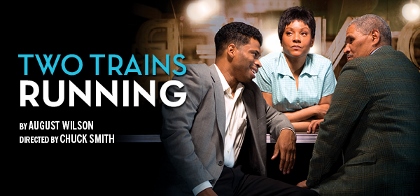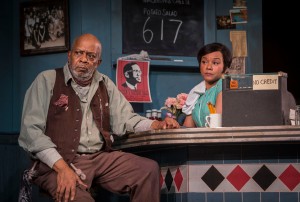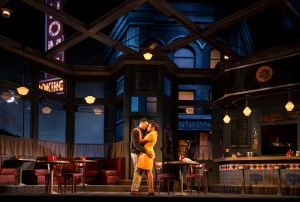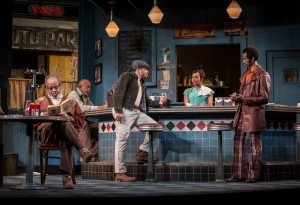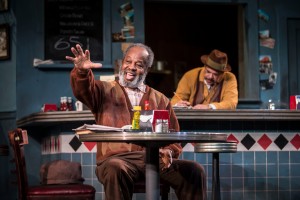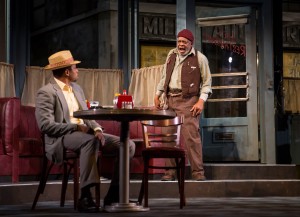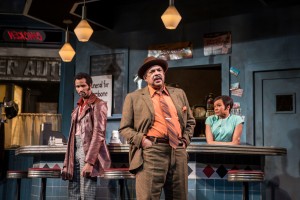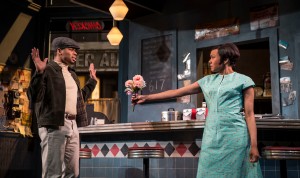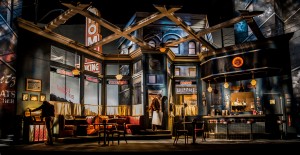THEATER’S TALKING CURE AT WORK AND PLAY
The first theater to perform all ten dramas of the late August Wilson’s 20th century chronicle, Goodman Theatre just staked a new claim to a lasting legacy. 22 years after its 1993 local premiere, Two Trains Running returns, a time capsule that entangles today. As much a warning as a matter of memory, the inequity that Selma couldn’t end and that Ferguson continued is center stage for three tasking hours.
Chuck Smith’s smoking staging not only reprises Wilson’s textured talkfest: Inevitably, it uses the changing context of two more decades to prove Wilson’s constancy to America’s contradictions. Seen from the sidelines, the civil rights movement comes down to conversations, history as it happens. Not only are the people the plot in this confluence of gritty characters–they’re the play. Two Trains Running exists not for any high-risk conflicts it presents or even its snapshot-sharp details about the Hill District of Pittsburgh circa 1969, mired in need and convulsed with change. It’s here to let seven souls speak.
This is eavesdropping raised to a sweet, if overlong, science. The magnificent seven talk themselves into existence, vibrantly and organically. The setting is Memphis Lee’s decaying diner with its defective jukebox, where regulars gab and a new arrival shakes things up. Two very different occasions provide pasts and future backdrops: Looking back, there’s the imminent funeral and burial of Prophet Samuel, a spiritual mentor more reverenced than heeded. Looking ahead, a Malcolm X birthday rally is scheduled to demand jobs and justice–but will it work?
Closer to home, Memphis (Terry Bellamy) wants not only to avoid Pittsburgh’s eminent-domain condemnation of his place but to get $25,000 for the site and property. Will he let the city take it over or sell it to funeral parlor owner West (A.C. Smith), a hard-fisted local mogul? Or will, as the 322-year-old living ancestor Aunt Esther suggests, Memphis return to his Dixie roots, driving a Cadillac in slow-motion revenge against the crackers who sent him north?
That’s about as much as hangs in the balance in this backwater where bad luck and hard times last longer than anyone should endure. The “action” is storytelling that passes for survival. Bellamy works wonders to convey Memphis’ stubborn streaks, while Nambi E. Kelley’s Risa, a quietly intense waitress who distrusts the violence in the men around her, is all about the scars she cut into her legs so she can only be prized for herself, not her parts.
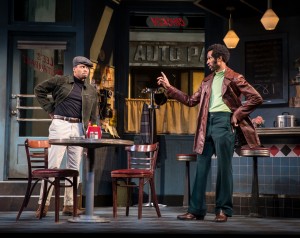 Instantly intending to marry her, ex-con Sterling (Chester Gregory) is a young blood impatient for wealth and ready to blame his failure on a mean world. His incipient black nationalism irritates neighborhood sage Holloway (Alfred H. Wilson), a veteran defeatist with folk wisdom to spare: Giving up on his own dreams, he urges Sterling to see Aunt Esther to change his fate. (Her answer, as usual, is for hope seekers to throw a $20 bill in the Monongahela River and wait for better days.) Sterling would rather get rich quick playing the local lottery, embodied by Wolf (Anthony Irons), a numbers runner who trades in hot guns as a sideline: He likes his women in the daytime because he can’t trust people enough to close his eyes. But, just as in life, the numbers payoff can’t be relied on either: It gets “cut” if too many players threaten to win the same three numbers.
Instantly intending to marry her, ex-con Sterling (Chester Gregory) is a young blood impatient for wealth and ready to blame his failure on a mean world. His incipient black nationalism irritates neighborhood sage Holloway (Alfred H. Wilson), a veteran defeatist with folk wisdom to spare: Giving up on his own dreams, he urges Sterling to see Aunt Esther to change his fate. (Her answer, as usual, is for hope seekers to throw a $20 bill in the Monongahela River and wait for better days.) Sterling would rather get rich quick playing the local lottery, embodied by Wolf (Anthony Irons), a numbers runner who trades in hot guns as a sideline: He likes his women in the daytime because he can’t trust people enough to close his eyes. But, just as in life, the numbers payoff can’t be relied on either: It gets “cut” if too many players threaten to win the same three numbers.
Finally, there’s misfit Hambone (Ernest Perry), a mentally disturbed house painter rampaging with rage as he demands a ham for services rendered to a white rip-off artist (instead of the lousy chicken he got as payment). The characters’ reactions to Hambone provide a litmus test for how much change they can handle and how much hope they can harbor. Coping with poverty takes many forms: Sometimes it’s better just to believe, like Sterling, that the moon is getting too close to earth and our sorrows will soon be superfluous.
Along the way Smith’s superb septet regale us with neighborhood gossip teeming with telling anecdotes (full of the “N-word”) that make the Hill District as palpable as Faulkner’s Oxford, Mississippi. Debates erupt about how much responsibility people can assume if individual merit doesn’t matter and group action backfires. The shared experience of these voluble dreamers is greater than their showcase soliloquies. Wilson remains unsurpassed at catching people in the act of anything, so authentically that it’s no act at all. He makes theater honest all over again.
photos by Liz Lauren
Two Trains Running
Goodman Theatre, 170 North Dearborn
ends on April 12, 2015 EXTENDED to April 19, 2015
for tickets, call 312.443.3800 or visit www.GoodmanTheatre.org
for info on Chicago Theater, visit www.TheatreinChicago.com
